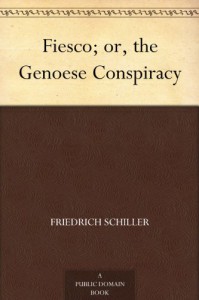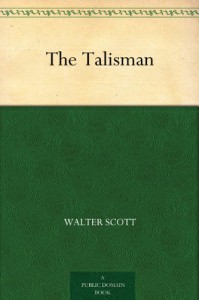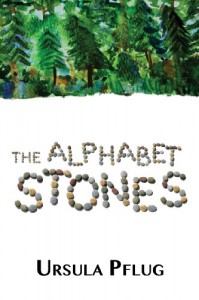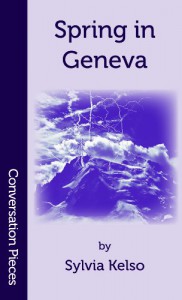between4walls
"I was always a mad comet..." Wilfred Owen
Publishers Weekly reviewer.
My new book blog
Moving my book blogging over to Maya Reads Books at Wordpress. Hope to see you there!
We Were Liars- E. Lockhart

I cried, both when I skimmed for plot and when I read it properly. The ending is devastating, and I love a good friendship story.
(show spoiler)
I think the characters of the Liars could have been fleshed out a little more. But Lockhart does a lot in a fairly short book.
(show spoiler)
Fiesco, or the Genoese Conspiracy: A Republican Tragedy- Friedrich Schiller

This is Schiller still in his younger throw-in-everything-and-the-kitchen-sink phase (cross-dressing, republicanism, oaths, assassination plots, adultery, betrayal, rebellion!), recounting the twists and turns of the titular "Genoese Conspiracy." Highly entertaining, though I keep reading Schiller to find something that matches the brilliance of Don Carlos and yet again I was disappointed. Because the play has two different endings, I was left guessing how it would end even though I basically knew the plot- this is the tragic ending and I liked it.
Fiesco's motivations can be a bit hard to follow as at one point he says that to throw away a diadem is divine, planning not to make himself Duke, but then the next scene he's changed his mind.
Verrina's last line is one of those typical wham lines that end a Schiller play- "I go to join Andreas." Wait! You were the most ideological republican of the conspirators, and now, after Fiesco's betrayal, which you knew was coming and avenged, you go over to the side of the autocrat? How does that make sense? Verrina is a pain, especially in his melodramatic imprisonment of the innocent Bertha to manipulate the other conspirators, but his politics make sense until that last line. It sounds like I'm complaining about that line, but really it makes you think and has an emotional impact and I think it would work on stage. It's just hard to make sense of.
The scene (one of two variants, and the better of the pair) in which Bertha cross-dresses and goes out into the streets, rescuing herself, is fantastic, and the tragic consequences of Leonora's similar action have a sickening inevitability.
Andreas Doria is a fascinating character, a magnanimous tyrant who disarms Fiesco by his refusal to react to his treachery, leaving himself open to whatever Fiesco does. I like that the play argues that tyranny is a problem even when the tyrant is basically a good ruler (not that Andreas will or can reign in his horrible heir).
The character of the Moor (referenced in Vasily Grossman's Life and Fate) is cheerfully villainous in a Richard III way, with the humor coming from his incompetence. Fiesco casually uses him until he no longer needs him, then disposes of him (thus the Grossman reference) but this is complicated by the Moor's betrayal of Fiesco at one point and Fiesco's mercy then.
Pretty sure this review makes no sense unless you have read/are familiar with the play, but whatever. In conclusion, everyone should read Don Carlos, but if you like The Robbers, this is for you as well. I think this would work pretty well on stage.
Where It Began- Ann Redisch Stampler

This is one of those books where the protagonist wakes up after a car crash with amnesia and has to figure out what happened. Except in this case, she's in denial about what actually happened the night of the crash even as the clues pile up. It's psychologically interesting, if predictable. I loved Gabby's voice and her passion for art as well as her realistic, frightening low self-esteem and the whole plotline about her "drinking problem," which has several twists. Very well-done.
Sigh that the Indian girl is the one with caricature-like uber-strict parents, although to be fair Gabby's other friend is a white born-again Christian with the same problem. I really liked the depiction of the stupid, frustratingly dense, but sweet and basically moral Andi and the driven Huey, who finally reveals the brutal truth to Gabby.
Seaward- Susan Cooper

I read this on the recommendation of the same friend as The Winter Prince, but this one wasn't as much of a success. I really liked the first half, with its mysterious urgency and perils, as we struggle, like Callie and West, to understand the rules of this new world and the reason for their journey. Everything through the mysterious castle was marvelous and all of a piece, but once we got to Callie and West's journey through the desert, the tension dropped, and the allegorical ending was a bit obvious for me. The gender roles sometimes rubbed me the wrong way, but the book and the characters seemed aware of the that.
The ending reminded me of a less brutal The Amber Spyglass (a book I love to bits) and I wonder if Seaward influenced that ending.
Publishers Weekly reviews
So, I will now be writing reviews for Publishers Weekly. Because the reviews are anonymous, I can't mention the books on social media, so there will be some books I read that don't appear on my shelf or on this blog.
I'm really excited about this!
The Quiet Gentleman- Georgette Heyer

'But this is Gothick, Frant, quite Gothick!'
Unlike most of Heyer's novels, this is not primarily a romance, and it has a good deal of plot. That is probably why I enjoyed it despite having recently given up on Frederica. The protagonist is is less worried about who he will marry and more about who is trying to murder him.
Gervase Frant has returned alive from the wars, in which most of his relatives hoped he would perish, and claimed his inheritance. No sooner has he arrived in the same house as his sullen half-brother, awful stepmother, and protective cousin, than strange, potentially fatal accidents start to befall him. Meanwhile, his best friend visits him, the local belle is pursued by everyone, and a furtive, slangy valet attracts suspicion. The identity of the culprit is quite easily guessed (I was sure before I was halfway through) but the quiet final revelation is still emotionally effective in terms of both the betrayal involved and the reasons the culprit turned out the way he did.
There are two romantic subplots, one involving a flirtatious young girl whom everyone is in love with and whom the half-brother twice tries to force himself on- of course, everyone and the narrative think she's at fault for flirting in the first place. However, she gets a nice happy ending with a much nicer man. The other romantic subplot involves the hero and a highly sensible girl raised by progressive parents, who are gently laughed at by the text, but who are noted to have given their daughter a strong sense of duty toward her dependents. Her practicality, however, is all her own. Though for plot reasons she must be kept out of the finale, Drusilla Morville does save the day when Gervase is shot, and afterward argues with herself amusingly:
'He would have liked me better had I fallen into a swoon!" argued Drusilla. 'Nonsense! He would have been dead, for well you know that no one else had the least notion what to do!" said Miss Morville.
But this is Gervase's story. By the end the title has a double meaning, but it certainly refers to Gervase, a "quiet gentleman" in his easygoing manners and fear of scandal, but the most obstinate man his friends (and foes) have ever known. He has a steel backbone and canny way of outwitting others and getting his way despite appearances, all of which serves him in good stead as he matches wits with his unknown enemy.
'...I am really very much harder to kill than any of you can be brought to believe.'
The Sunbird- Elizabeth E. Wein

Book three of Wein's Arthurian/Aksumite series takes up the story of the next generation, with Medraut's twelve-year-old son Telemakos as protagonist. Unlike the first two books in the series, it is told from the third-person point of view, and unfortunately, I think that made it less interesting. The protagonist was less complex than in the other two books and the plot less original in structure, though in substance it was quite interesting: the very young Telemakos becomes a spy to figure out who is breaking quarantine during a plague in order to profit from the situation. Even though the main villain is a bit obvious, he is also genuinely scary, both in his venal motivation and his very creepy actions and speech patterns- he constantly refers to Telemakos as "it."
Ultimately this book felt geared for a younger audience than the first two books. The interpersonal relationships were more obvious- Telemakos yearns for his voluntarily mute, trapped-in-the-past father to live in the present and speak to him, paralleling his namesake's desire for his father's return. The climax once again spells out too much explicitly. On the other hand, Goewin and Medraut's relationship continues complex, and the new character Sofya is sharp-edged, sometimes sympathetic, sometimes a jerk, and all in all a worthy addition to the cast.
Telemakos's reactions to his tribulations are realistic, his gift for hiding something he practices and works at, and his final confrontation with the villain spellbinding. I would recommend this to readers 10-14, but it's not something I would have picked up if it were not for the rest of the series. It's very satisfying to see how Goewin grows while remaining the same character, and she plays a major and thoroughly enjoyable role. It also wraps up some outstanding issues about Medraut. The book stands alone, but makes reference to the events of others; Medraut and Goewin's conflict refers back to what Medraut did in The Winter Prince and what Goewin considered doing in A Coalition of Lions.
This is where I would recommend a younger reader (someone Telemakos's age) to start, but while it's the author's favorite of the series, I think that while it's very good at what it does, what it does is less interesting than what the previous books do.
Short Story- "No Human Hands To Touch"- Elizabeth Wein

'Medraut,' I murmured, 'Do not call me Jocasta, or I will let you borrow my brooches...'
Have this story (published in "Sirens and Other Daemon Lovers," available as an ebook) on hand immediately after reading The Winter Prince (which I highly recommend you do!). Told from the point of view of the antagonist Morgause, it fills in some of the protagonist Medraut's backstory, which is darkly hinted at in the book. It shares an amazing atmosphere with the book which isn't apparent in the sequels: It's full of tension, self-destructive pride, defiance, messed-up family relationships, cruelty, and loneliness.
His lips curled back, barely, and he croaked at me, 'I do not need your brooches.'
A Coalition of Lions- Elizabeth E. Wein

Sequel to The Winter Prince, though focusing on a different protagonist. The first-person voice is beautiful and gripping, but without the tension and darkness that make The Winter Prince unique.
I was nervous after the first few pages, where most of the characters from the previous book are killed off, but
(show spoiler)and if I hadn't known that going in, I wouldn't have continued.
Unusually, this is a book without a villain- there are antagonists, but as the title intimates, they are not defeated but rather brought into alignment with the protagonists via compromise. There are no irredeemable or even wicked characters, but rather people with differing flaws and agendas struggling to get their way and believing themselves in the right. Goewin, the main character, even identifies with and at times parallels the villain of the first book.
The setting is also worth noting- ancient Ethiopia, where the British Goewin flees from her war-torn country, in a neat reversal.
Many tropes from the first book repeat- fraught sibling relationships, the problem of lesser royalty, accepting you won't rule, physical abuse and punishment, defiance, the rulers mishandling relationships but then redeeming themselves, a hunt on which loyalties are tested and forged. The plot and setting, however, are quite different.
Edited to add: You have to love a YA book where the main motif is the Song of Songs, and the female protagonist is described as "terrible as an army with banners."
The Talisman- Walter Scott

"...for know, that had my assailant been in very deed the Prince of Darkness, thou wert bound not the less to enter into combat with him in thy comrade's behalf."
If you loved Ivanhoe, as I did, and want something similar with more Richard the Lionheart, this is it. If you, like me, love the legends of Coeur de Lion and Saladin and aren't particularly interested in the accuracy of the details of the Crusade, this is also for you. It can be read as a prequel to Ivanhoe, though it shares only one character, or it can be read alone.
The plot is derivative if you've read other Walter Scott books and is somewhat a pale copy beside Ivanhoe- there's a false accusation, several important personages incognito, hopeless love across-but-not-too-far-across social boundaries, a last-minute champion, conspiring Templars, and plenty of humor.
"...it came to that pass that he was regarded as the determined and active enemy of a nation, whom, after all, he only disliked, and in some sort despised."
The style is, as usual, easy, eloquent, and often funny; the pacing perfect. One final twist
(show spoiler)seemed to vitiate one the main conflicts, but in compensation Conrade of Montserrat (more properly Montferrat or Monferrato- the area where my mother is from) appears, albeit as an antagonist.
It's a wonderful world to spend time in, where motives are high and vows sacred, where people on different sides of a bitter conflict can behave honorably to and even have affection for each other.
Scott is quite underrated these days, but he's reliably entertaining and more aware of the foibles of the eras he idealizes than he gets credit for in the popular imagination.
The Winter Prince- Elizabeth E. Wein

"'Can you even love?'
'Yes. Yes. All the wrong things. The hunt, and darkness, and winter, and you, Godmother.'"
This is a book I wish I had written.
It is a first novel, and cool and sharp and glittering, like a heavy, hanging icicle. It is very dark, with just enough hints of the backstory to let you fill the rest in for yourself.
It is an Arthurian retelling, focused on Mordred, in a version in which Arthur has legitimate heirs.
The narrator, Medraut, is complicated and brave and oh-so-fallible, like his siblings and father, the other central characters. He addresses his narration to his mother-and-aunt Morgause, who is terrifying- sadistic and false and capable of cutting to the bone.
The ending departed slightly from the subtlety of the rest of the book, spelling out the epiphany, but that's a minor complaint. The voice is intense, deliberate, engrossing.
The Winter Prince is a short read, just over 200 pages, and a brilliant one. There are sequels, but they branch out further from the Arthurian setting and don't seem as good. This one stands alone, and is a masterpiece.
Books and Plays Read in 2013
Bold = particularly enjoyed and recommend
- Romola- George Eliot
- The Hunchback of Notre-Dame- Victor Hugo
- My Real Children- Jo Walton (draft)
- State of Revolution- Robert Bolt
- Karl Liebknecht- Helmut Trotnow
- Up from Serfdom- Aleksandr Nikitenko
- Danton's Death- Georg Buchner
- Woyzeck- Georg Buchner
- Cato- Joseph Addison
- Tis Pity She's a Whore- John Ford
- Crime and Punishment- Fyodor Dostoevsky
- When the King Took Flight- Timothy Tackett
- The Cuckoo's Calling- Robert Galbraith (J.K. Rowling)
- The Little Golden Calf- Ilya Ilf and Evgeny Petrov
- The Charioteer- Mary Renault
- United We Spy- Ally Carter
- Farewell Great King- Jill Paton Walsh
- The Traitor Baru Cormorant- Seth Dickinson (draft)
- Carnival- Elizabeth Bear
- The Drowning Girl- Catilín R. Kiernan
- Code Name Verity- Elizabeth Wein
- Lenz- Georg Buchner
- Clockwork Prince- Cassandra Clare
- Faro's Daughter- Georgette Heyer
- Sylvester, or the Wicked Uncle- Georgette Heyer
- Shattered Pillars- Elizabeth Bear
- The Just City- Jo Walton (draft)
- The Philosopher Kings- Jo Walton (draft)
- Cry Murder! In A Small Voice- Greer Gilman
- The Wicked and the Just- J. Anderson Coats
- Angel Eyes- Nicole Luiken
- King John- William Shakespeare
- The Russian Revolution 1917: A Personal Record- N. N. Sukhanov, edited by Joel Carmichael
- Hammered- Elizabeth Bear
- The Winter Prince- Elizabeth Wein
- Eastern Approaches- Fitzroy Maclean




